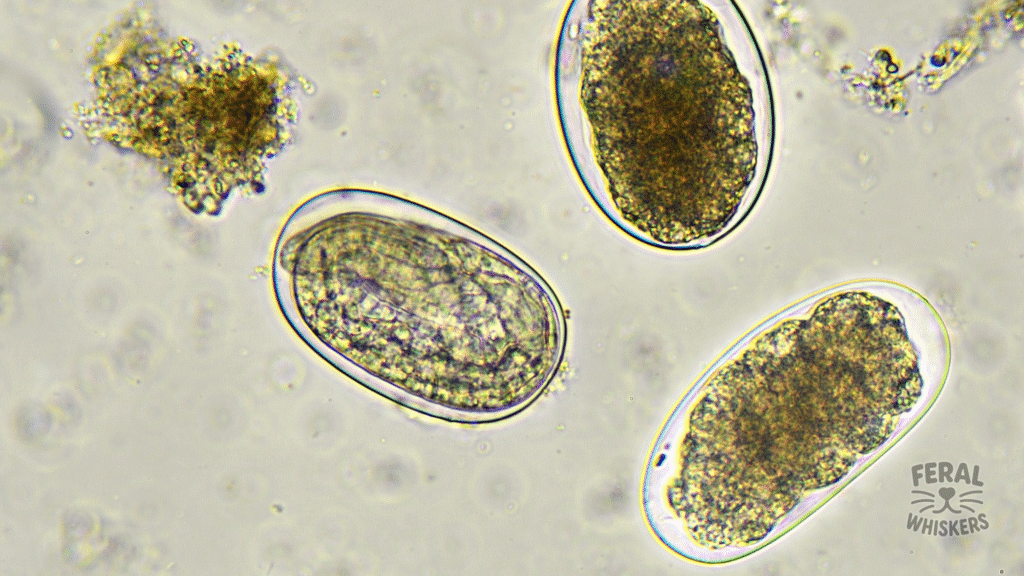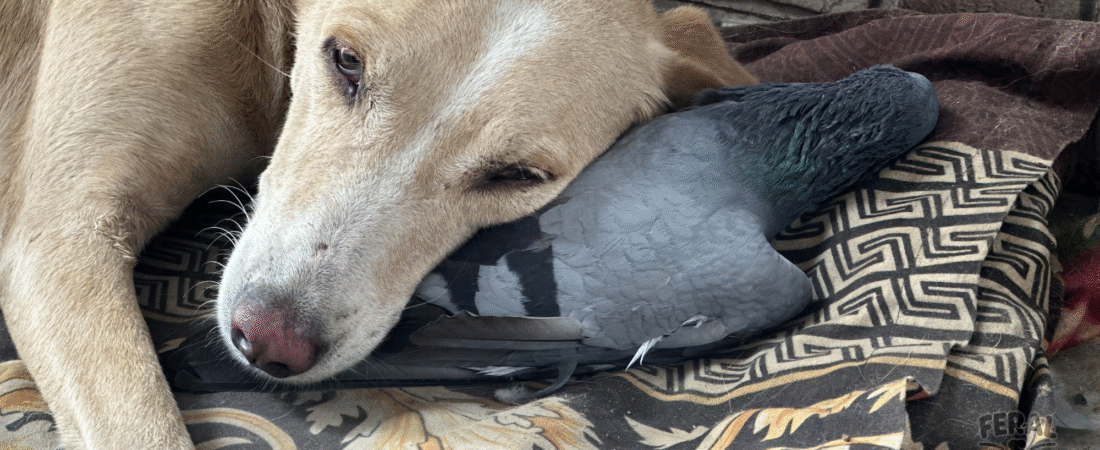Why These Worms Matter

Unlike roundworms and tapeworms, hookworms and whipworms feed on your dog’s blood.
- Hookworms attach to the small intestine, causing anemia, bloody diarrhea, and weakness.
- Whipworms hide in the colon, causing inflammation, weight loss, and chronic diarrhea.
Both worms can be hard to detect at first, but left untreated, they can make your dog seriously ill and even be fatal in puppies.
1. What Are Hookworms and Whipworms?
Hookworms (Ancylostoma, Uncinaria)
- Very small (~1 cm) worms with sharp mouthparts.
- They attach to intestinal lining and literally drink blood.
- Puppies are especially at risk.
Whipworms (Trichuris vulpis)
- Named for their whip-like shape: a thin end and a thickened end.
- Live in the large intestine and cecum.
- Cause irritation, inflammation, and chronic colitis.
- Eggs survive in soil for years, making reinfection common.
2. How Dogs Get Hookworms or Whipworms
- From the environment: Dogs ingest infective eggs/larvae in soil, parks, or contaminated areas.
- Through skin: Hookworm larvae can penetrate skin when dogs lie on contaminated ground.
- From mother: Puppies may get hookworms through their mother’s milk.
- From prey: Eating rodents or contaminated raw meat.
3. Symptoms
Hookworms
- Pale gums (anemia)
- Bloody or dark, tarry stools
- Diarrhea, sometimes vomiting
- Weight loss
- Weakness, lethargy
- Puppies: potbelly + life-threatening anemia
Whipworms
- Chronic, intermittent diarrhea (sometimes bloody)
- Straining to defecate (tenesmus)
- Weight loss, poor body condition
- Dehydration in advanced cases
- Sometimes blood or mucus coating the stool
4. How Vets Diagnose
- Fecal examination: Detects eggs under a microscope.
- Challenge: Hookworm larvae may be missed if numbers are low. Whipworm eggs shed intermittently, so vets may need multiple stool samples.
- Blood test: Hookworm anemia often shows up in complete blood count (low red cells).
5. Veterinary Treatment
Deworming Medications
- Hookworms:
- Pyrantel pamoate (common puppy dewormer).
- Fenbendazole.
- Milbemycin, moxidectin (broad-spectrum preventives).
- Whipworms:
- Fenbendazole (several days, repeated 3 weeks later).
- Milbemycin oxime (Interceptor Plus, Simparica Trio).
Puppies with Hookworms
- Lifesaving immediate deworming every 2–3 weeks until 12 weeks old, then monthly.
- May need iron supplements or even blood transfusion in severe cases.
Adults
- Regular monthly preventives that cover all major intestinal worms.
- Fecal exams twice a year in high-risk areas.
6. Prevention
- Pick up poop daily to stop eggs contaminating soil.
- Keep dogs on year-round broad-spectrum preventives.
- Avoid letting dogs eat rodents or raw untreated meat.
- Don’t let puppies nurse from untreated mothers.
- Maintain clean kennel/backyard hygiene.
7. Zoonotic Risk (Human Safety)
- Hookworms can infect humans by skin penetration (cutaneous larva migrans).
→ Causes red, itchy, winding skin rashes (“creeping eruption”). - Whipworms do not typically infect humans.
- Teach children not to play barefoot in dog-contaminated soil.
8. Holistic & Budget-Friendly Support
Vet meds are required to treat active infections. But natural methods help prevention, recovery, and immune gut health.
Food Remedies
- Pumpkin seeds: Contain cucurbitacin, may paralyze worms. Add 1 tsp/10 lbs daily.
- Grated carrots: Add fiber → help intestines pass parasites.
- Coconut oil: Antimicrobial, supports gut lining.
- Garlic (tiny doses): Can help reduce parasite load (with caution).
Herbal Support (with holistic vet guidance)
- Diatomaceous Earth (food grade): Dust light amounts into food (¼–1 tsp depending on size). Helps dry out larvae in gut.
- Wormwood, Black Walnut, Cloves: Potent herbs with anti-parasitic effects. Must be carefully dosed to avoid toxicity.
Gut & Immune Recovery
- Probiotics & Yogurt/Kefir: Rebalance gut flora after worm burden.
- Bone broth: Gentle nutrition for recovery.
- Iron-rich foods: Cooked liver or spinach for anemia recovery (especially after hookworms).
Budget Hacks
- Rotate outdoor play areas to allow soil to rest (worm eggs survive long).
- White vinegar and boiling water for disinfecting kennels or hard surfaces.
- Regular cheap fecal checks at low-cost vet clinics or shelters.
9. Step-by-Step Plan for Fur Parents
If Your Puppy/Dog Has Hookworms or Whipworms:
- Vet check and deworming immediately.
- Repeat deworming as recommended (3-week re-treat for whipworms).
- Feed iron-rich, easy-to-digest diet to support recovery.
- Keep puppy indoors/clean area until parasite-free.
- Pick up poop promptly.
If You Cannot Access Vet Immediately:
- Add pumpkin seeds, grated carrots, coconut oil to meals.
- Give homemade bone broth for gut/nutrient support.
- Maintain hydration with water + unseasoned broth.
- Still save toward having the dog dewormed properly — natural methods cannot fully clear these worms.
10. FAQs
Q1: My puppy is very pale — could it be hookworms?
Yes. Pale gums are a classic sign of anemia, often from hookworms. Emergency vet care needed.
Q2: I don’t see worms in poop — so my dog doesn’t have them, right?
Not true. Hookworms and whipworms are tiny and rarely visible in stool. Diagnosis requires stool tests.
Q3: Can humans catch these worms?
Hookworms can penetrate human skin. Whipworms generally don’t infect people.
Q4: Why do whipworms keep coming back?
Their eggs can survive in soil for years. Reinfection happens easily. Regular monthly preventives are best.
Q5: Can home remedies cure hookworms or whipworms?
No. They may reduce numbers or support gut health, but prescription dewormers are required for full elimination.
Common Concerns
| Concern | Straightforward Answer |
|---|---|
| “My dog keeps losing weight but eats well.” | Could be whipworms draining nutrients. |
| “Puppy coughing — is it worms?” | Hookworm larvae migrate through lungs before settling in intestines, can cause coughing. |
| “I’ve already dewormed — why are worms still there?” | Some eggs survive; repeat treatments are often needed for whipworms. |
| “Too expensive to buy meds every month.” | Preventives are cheaper long-term than treating severe anemia, diarrhea, transfusions. Try low-cost clinics. |
Final Takeaway
Hookworms and whipworms are silent but dangerous — robbing your dog of blood, nutrients, and energy. Puppies are especially at risk of life-threatening anemia from hookworms, while whipworms cause chronic diarrhea and weight loss in adults.
The winning strategy is:
- Vet-prescribed deworming and preventives.
- Good hygiene (pick up poop daily).
- Supportive holistic care (gut-strengthening foods and nutrition).
By combining proper treatment with consistent prevention, you can keep your dog safe from these bloodsucking parasites and help them thrive.

